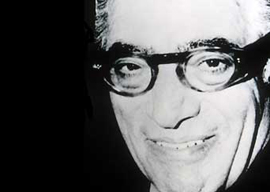
September 29, 2010

When Tom Wolfe harpooned Leonard Bernstein in his famous 60s essay, he did it by directly quoting from those attending the infamous cocktail party Lenny gave for the Black Panthers. Wolfe had finagled an invite to Bernstein’s grand 5th Avenue pad and was taking notes throughout the evening. The end result was devastating. In fact, it killed radical chic once and for all. The rich and famous stopped giving dinners for cop killers and drug dealers, turning to philanthropy instead. Soon after, the great social climb began with a vengeance. John Fairchild’s “Nouvelle Society” was created, and Steinberg, Kravis, and Gutfreund became household names by paying a hell of a lot of money for their seats at charity balls. But it was Tom Wolfe who slew the dragon of radical chic, which had been started in California—where else?—by publicity-seeking rich lovies.
One of Tom’s quotes I treasure was the one that had art dealer Richard Feigen sweating and rather desperately following some big shot around asking, “How does one rent a Panther?” Feigen, the Panthers, and I go way back. When I lived in the Hotel du Cap during the summers of the 50s and 60s, Feigen would watch some pretty rich fellows drop by my cabana—people with names such as Thyssen and Agnelli—so he hatched a plan. He offered me a job selling his art to people like that. I took it rather badly. Art dealers back then were considered spivs and conmen, so I told him to shove it. Years later I went to Algeria and interviewed the top Panthers, including Eldridge Cleaver, who were under house arrest having fled America after killing a few cops. (“Oh man, what wouldn’t I give for a hamburger” was the way Cleaver put it.) National Review made it a cover story, and I was on my way.
Which brings me to the point of my story. Wolfe was present at the party and reported accurately about it. I met the Panthers in Algiers, broke bread with them, and reported likewise. Sure, both Tom and I knew how to slant a story and how to make Bernstein and the Panthers look ridiculous—all we had to do was quote them—which makes it fair.
What is very unfair is to make the whole thing up, which is what a hack writer by the name of Peter Evans did to Aristotle Socrates Onassis, making a fortune as a result. I have no way of knowing if Evans ever met Onassis, but I doubt it. Ari knew a lot of people—actually the other way round—and as he was always on the go and did not use muscle, anyone could approach him and then claim friendship. Evans’s book Nemesis was packed with conspiracy theories meant to sell the book. Onassis was long dead and hence unable to sue. The worst lie of all was that Onassis helped organize and finance Robert F. Kennedy’s assassination. The book sold like hotcakes, and it was all one big lie. Such are the joys of fame. Any hack can invent anything and sell it to the great unread and laugh while spitting on someone’s grave. Evans is such a bull artist he even thanks me in the acknowledgements—a bit too much really, as I don’t agree with a thing he says about Onassis.
The irony is that Onassis and Bobby Kennedy got on fine and liked each other. Three months before Bobby’s assassination, I was at a party given by Susan Stein in her Upper West Side flat and saw the two of them sitting side-by-side having a hoot. Bobby was asking Ari openly but jokingly for funds, and Onassis had turned his pockets inside out claiming poverty.
At the time, Ari and Jackie had been making whoopee for years. Bobby asked them not to make it official until after the ’68 election, which they agreed to do before breaking the pledge after he was murdered in June ’68. Had Evans written that Onassis had paid Lee Harvey Oswald to murder JFK, he would have been just as wrong as he was when he wrote the rubbish he did about the Golden Greek and Bobby.
Now a play based on the book has opened in Derby, and it moves to the West End next month. Robert Lindsay, who plays Ari, is a great actor who was a terrific Fouquet in Power at the National Theatre. Lindsay is such a gifted actor he’s bound to show some good side of Onassis, but he’ll be hard-pressed to do so because of the script. Playwright Martin Sherman only has the Evans book to go on. There are scenes that have Onassis saying that his son should not be nice because nice means weak and so on: “I will not have a nice son.” What garbage. Onassis was a ruined man after his only son died in an airplane accident in 1973, and he died only two years later. I met Onassis in 1957, knew Alexander Onassis well, and I also knew the Bouvier sisters who became Kennedy-Onassis and Radziwill in turn. I also knew Maria Callas, but not well. She and Ari stayed close until the end, and she was never tortured by him as is claimed in that awful book. People live strange lives and are tortured by strange demons. Onassis liked his fame, but he would have forsaken it if he knew what it would bring him after death.